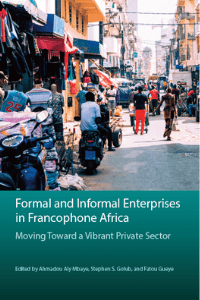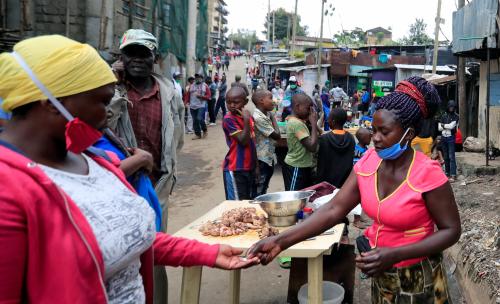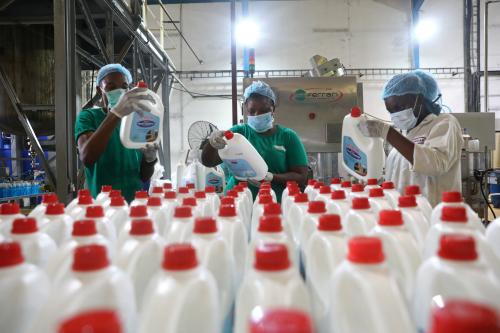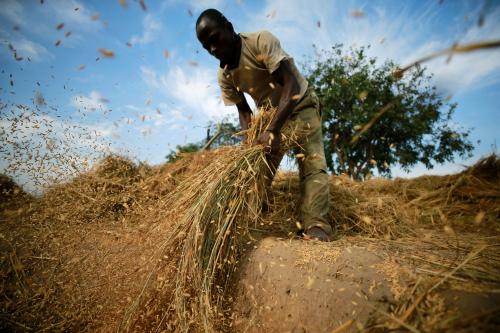As the COVID-19 global pandemic continues to disrupt the global economy, not only the health but the livelihoods of millions are at stake through reduced earnings and increased poverty. In our previous blog, we noted that during the 2008-2009 global recession, African economies performed better than other developing countries, because of (a) higher commodity prices, which supported export earnings; (b) lower debt, which provided needed fiscal space, avoiding public sector layoffs; and (c) the resiliency of the informal sector, which continued to supply the domestic economy, maintaining incomes and consumption for the majority of households. Africa will not be able to count on these mitigating factors this time. Commodity prices are not favorable, fiscal space is extremely limited, and, as a result, the informal sector, where 60 to 80 percent of Africa’s labor force works, will struggle to earn a living. In this blog, we elaborate on the threats to informal employment and earnings, and what governments should consider as they strive to counter these threats and support the informal sector workers.
What are the threats to informal sector livelihoods?
Informal sector employment—both in family farms and non-farm businesses—accounts for over 70 percent of hours worked in Africa and is a main income source for at least 60 percent of African households and over 80 percent of rural households. As the International Labor Organization (ILO) wrote recently, “[t]o die from hunger or the virus is the all too real dilemma faced by many informal economy workers.” The ILO estimates that as of April 22, 68 percent of informal sector workers in Africa lived in countries that already had implemented full or partial lockdowns.
Own-farm agriculture accounts for about one-third of total hours worked in Africa—even more in rural areas. As African farmers face COVID-19, any income not already affected by natural disasters such as locusts, drought, and flooding will be reduced in the near term as shutdowns—which stop production from moving off the farm to wholesalers—and reduced income in urban areas deprive farmers of markets. Harvested food stuck in rural areas is already causing food shortages as well as inflation in urban food prices. Farmers will continue to work their fields and feed their families with their own harvest (mostly), but may not have the cash needed for next season’s inputs or to pay for health care or schooling for their children without help.
Households in rural areas and small towns tend to have a non-farm household business on the side to earn extra cash and reduce seasonal underemployment. The majority of these businesses involve retail trade (kiosks for household consumables or farm inputs); other popular sectors are informal agro-processing (milling grains, pressing oilseeds) or farm-based craft manufacturing (making and selling baked goods, beer, or, charcoal), and services such as hairdressing. These businesses depend on household incomes from agriculture for demand, so their short-term future is grim. To cope with immediate needs, households may sell business assets for cash, compromising their bounce-back potential; although these businesses are undercapitalized in general.
Informal retail traders and service business operators are even more common in urban areas, accounting for almost half of total hours worked. These livelihoods are particularly vulnerable to social distancing rules and have less access to clean water and sanitation, although they will try to work somehow. Already, global value chain disruptions have resulted in a shortage of products and the inability of small traders to do business and generate income. Workers in Africa’s large urban gig economy—contract truck, bus, and taxi drivers, and operators of motorcycles for delivery and taxi—also face high risks to their health, income, and savings (if they have them in the first place).
The projected loss of wage and salary incomes when private firms or the public sector lay off workers and/or cut or delay wages will have knock-on effects for informal urban businesses. About half of urban households in Africa have a wage income, and this income is often the anchor for the riskier, entrepreneurial activities of other members of the household. Additionally, wage workers are the main source of demand for the goods and services sold by the urban informal sector.
More than half of the owners of informal business in Africa are women. Women-owned businesses tend to be smaller and less productive in Africa, as elsewhere. Their income is often a source of empowerment for them, within their household and in the broader community. These women already report challenges in keeping their businesses going without schools or child care options. If they must reduce hours or close their business to look after their children, they will face a double threat—not only less income but possibly more domestic violence. Then again, premature school openings could expose them to increased health risks.
Youth face different outcomes in urban and rural areas
In sub-Saharan Africa, about 7 million to 8 million youth will enter the labor force this year, facing even more limited prospects than in normal times. Urban youth are mostly educated, with high aspirations that will be dashed as the urban economy collapses. Experience suggests that those who can afford it will delay entering the labor force and just stay home. Those who cannot will join previous cohorts in trying to find a hustle on the street, in the informal sector, where reduced demand and social distancing rules have already limited opportunities. Unlike in rich countries, however, there is no evidence that this experience results in long-term damage to income-earning prospects.
In rural areas, most youth will stay at home and work on family plots, possibly trying to get access to a plot of their own to work for the next harvest season in countries where land is abundant. Without savings (their own or from their friends and family), however, they will struggle to establish livelihoods.
What should governments do to support informal sector livelihoods?
Donors and international financial institutions have promised substantial funds to support public sector budgets and the health sector, but support for informal sector workers, so far, is scant. Governments cannot ignore the damage already occurring to the livelihoods of these millions of people. The policy response should:
- Maintain household consumption among the bottom 75 to 80 percent of households, who have very limited savings. Limiting short-term household welfare damage, speeding up the overall economic recovery, and unlocking Africa’s business potential will depend on supporting demand in the economy. People need resources to buy needed consumption items. As in the U.S., cash transfers are the best option, and as Berk Ozler writes for the World Bank, experience shows that these programs are not hard for developing country governments to implement. Already, 22 sub-Saharan African countries have announced COVID-19 cash transfer programs, and an additional 13 are not providing cash but have announced in-kind transfers (e.g., food vouchers or food distribution, school feeding) instead.
- Protect the incomes of urban wage and salary employees. Although wage and salary work accounts for a small share of total non-farm employment—and tends to be more remunerative than informal sector work—wage and salary earners use their incomes to buy from informal sellers of goods and services, thus supporting the sector.
- Protect the health of urban informal sector workers by improving access to soap, water, and alcohol-based sanitizers for handwashing at urban markets and trading zones, and distributing masks and gloves to informal traders and service providers.
- To reduce food spoilage and support incomes, declare transport of food from the farm gate to markets an essential service.
- Ensure that police protect the livelihoods of informal vendors and service providers, especially in urban areas, rather than using the COVID-19 emergency to harass them.
The Brookings Institution is committed to quality, independence, and impact.
We are supported by a diverse array of funders. In line with our values and policies, each Brookings publication represents the sole views of its author(s).











Commentary
COVID-19 and the future of work in Africa: How to shore up incomes for informal sector workers
May 26, 2020